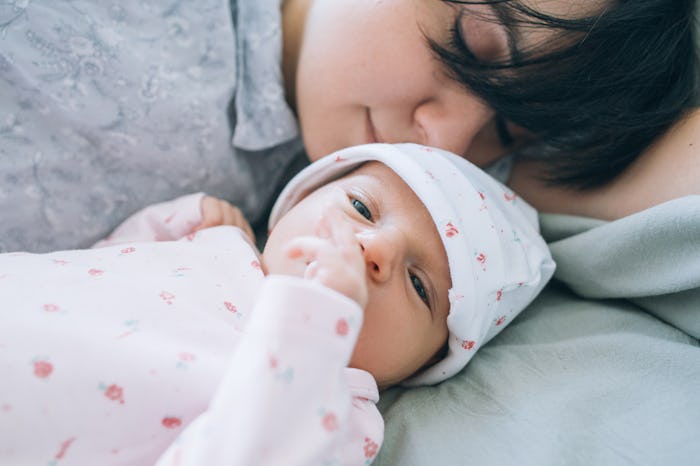News
Bed-Sharing Might Not Be As Dangerous As Doctors Thought, Report Finds
When it comes to putting baby to sleep, all parents have heard the same warning from their doctors: No bed-sharing under any circumstances. Past studies have linked bed-sharing, where you and your child sleep in the same bed, to an increase risk of sudden infant death syndrome (SIDS). But a new report suggests that bed-sharing may not be as dangerous as doctors believe, and that current recommendations should be re-evaluated.
An NPR featured published Monday took a deep dive into the data and conversation on bed-sharing, and found that the growing sleep practice among moms, in particular, may not be as harmful to an infant as other risks. For example, the National Oceanic and Atmosphere Administration estimated that a person has a 1 in 13,000 chance of being struck by lightning in their lifetime, according to NPR. In contrast, NPR reported that a low-risk baby has a 1 in 16,400 risk of dying of SIDS while bed-sharing, compared to a 1 in 46,000 without bed-sharing, according to data compiled by Dr. Ed Mitchell, a pediatrician from the University of Auckland and expert in SIDS research.
Mitchell told NPR, "For many babies, the risk of SIDS is very, very low to begin with. If you take a very, very low risk and multiply by three, the risk will increase, but it will still be a low risk."
There, of course, are caveats to this data, which Mitchell acknowledged in his interview with NPR. Infants who are considered high-risk, such as those born prematurely or have a low birth weight, have a heightened risk of dying from SIDS if they were to share a bed with their mom or dad, according to the Mayo Clinic. (By Mitchell's own research, the chance jumps to 1 in 150, NPR reported.) Infants sleeping next to parents who were drinking, smoking, or doing drugs also have a much higher risk of dying from SIDS when bed-sharing or sofa-sharing, according to a 2003 Archives Of Disease In Childhood study.
But these are specific situations that don't happen often, Peter Blair, a medical statistician at the University of Bristol, told NPR. And two studies have shown that, when these hazards are removed from the equation, the risk of SIDS decreases significantly, according to NPR. (It should be noted, though, even without those hazards, bed-sharing increases the SIDS risk by fivefold, according to a 2013 BMJ Open study.)
About 3,500 babies in the United States die from sleep-related causes, including SIDS, accidental suffocation, and unknown causes, according to the U.S. Centers for Disease Control and Prevention. That's why, in a 2016 policy statement, the American Academy of Pediatrics strongly recommended that bed-sharing should be "avoided at all times" with high-risk infants and full-term, normal-weight babies younger than 4 months old.
Despite studies that show bed-sharing is not as dangerous as it's framed, the AAP has no plans of changing its recommendation against bed-sharing, Dr. Lori Feldman-Winter, a member of the AAP's Task Force on SIDS, told NPR. But she does recognize that doctors need to be less critical and judgmental of parents who chose to bed-share.
After all, sleeping in the same bed as their infants is a growing practice among moms in the United States. A 2013 JAMA Pediatrics study found that bed-sharing increased from 6 percent in 1993 to 13.5 percent in 2010. In 2015, that number jumped to 24 percent, according to a Morbidity And Mortality Weekly Report study published in January.
But cities like Milwaukee have released campaigns that lump all types of bed-sharing together, and take a hard-line stance against the practice. One Milwaukee ad placed a baby next to a meat cleaver, with the cleaver standing in for the parent. The slogan? "Your baby sleeping with you can be just as dangerous."
But framing bed-sharing in such a dramatic way silences parents who do share their sleeping space with their kids. And that is actually counterintuitive to providing the tools necessary to prevent SIDS, according to experts who spoke to NPR.
As Feldman-Winter told the outlet:
We don't want families to feel uncomfortable telling doctors what they'red doing. Because then you take away the opportunity to provide education around what we do know about SIDS — and to be honest about what we don't know.
